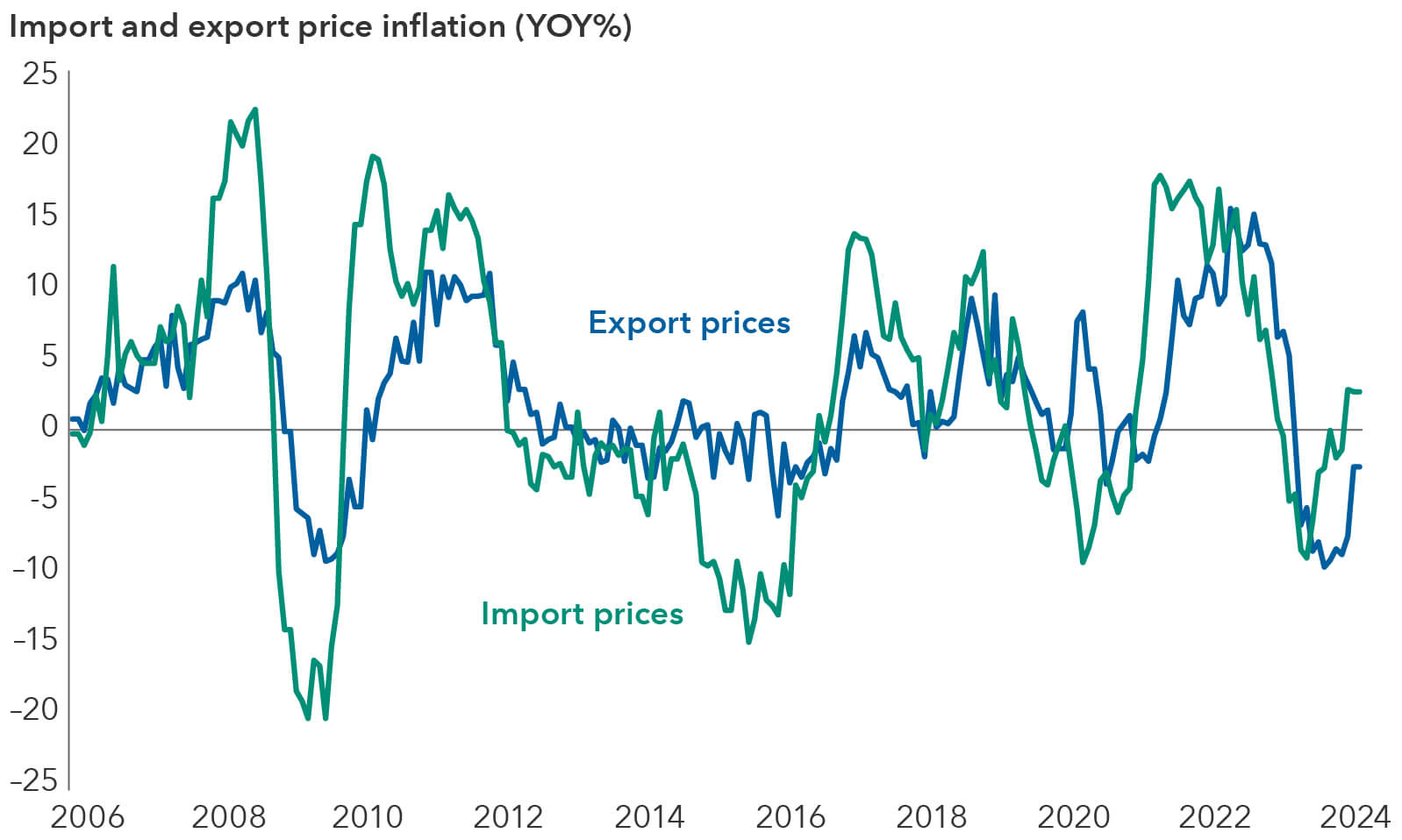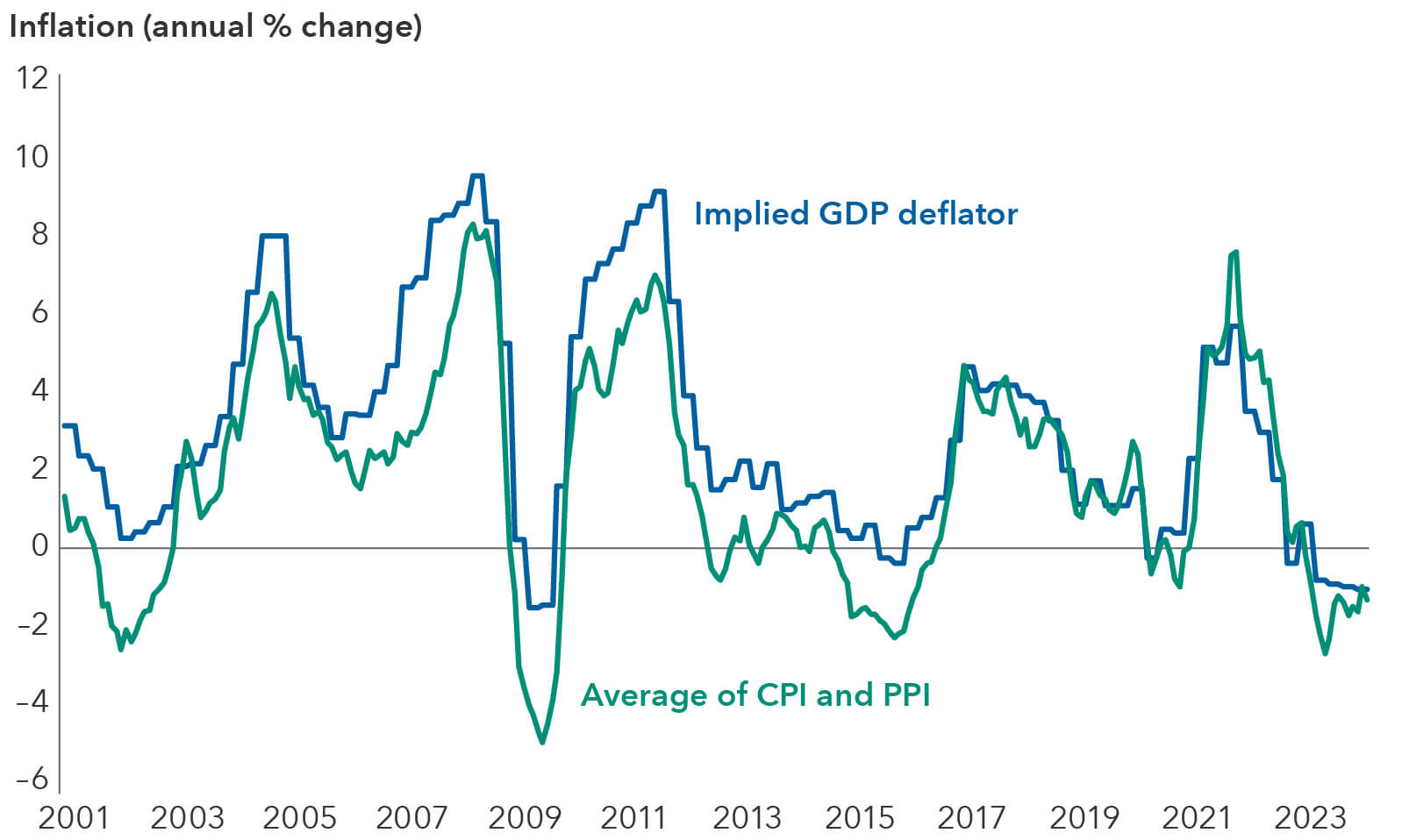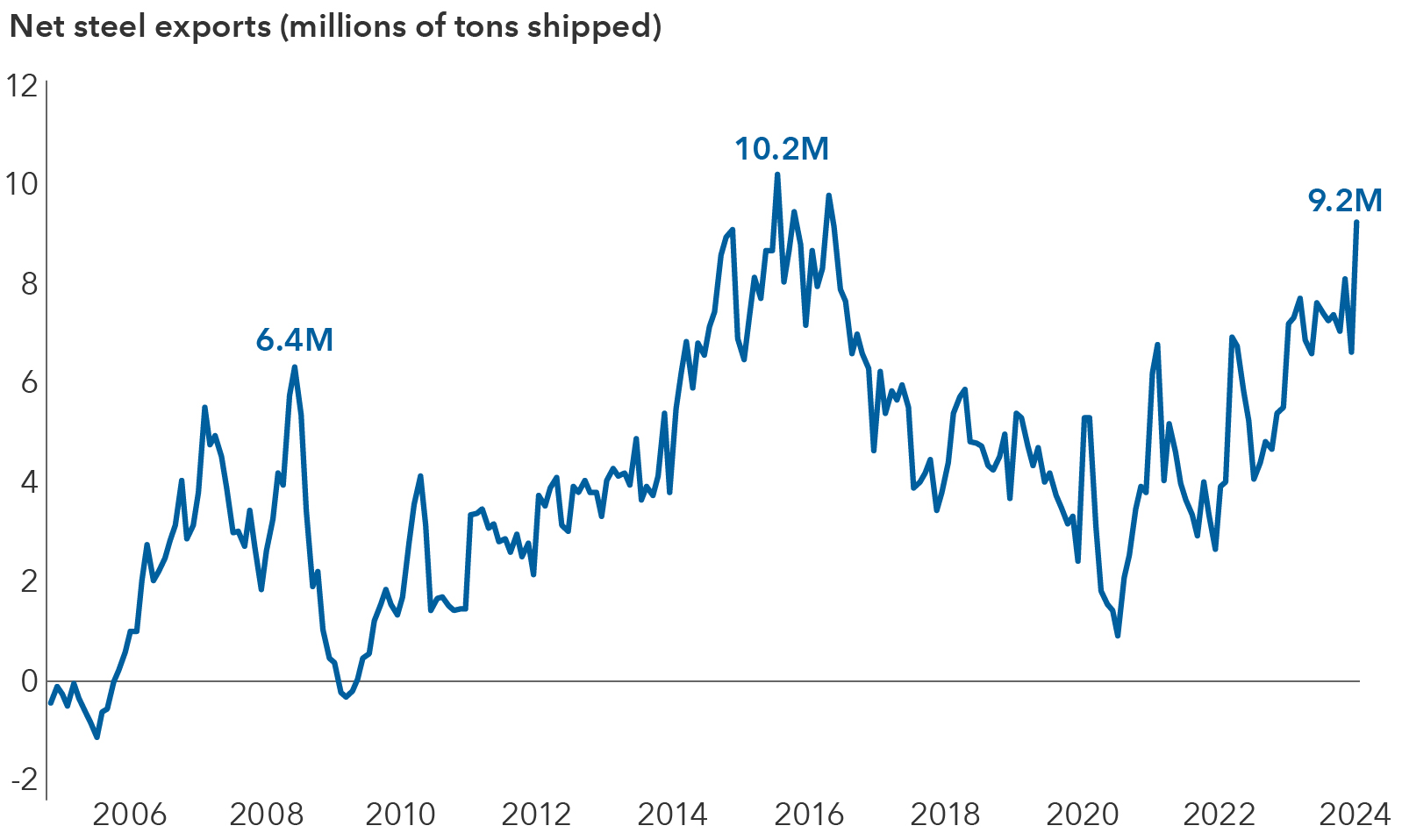China
China has a deflation problem, and it will take some time to fix. Low consumer confidence, falling home sales and weak manufacturing utilization rates all suggest lower priced exports for certain manufactured goods could continue to flood global markets over the next six to 12 months.
We are already seeing a backlash from a diverse set of countries that fear cheap imports could weaken their domestic industries. And I believe companies competing with Chinese-manufactured goods, particularly in areas of renewable energy equipment, machinery and electric vehicles (EV), will likely face an uphill climb for the foreseeable future.
As China’s economy has struggled since lifting COVID lockdowns in late 2022, policy makers have emphasized a manufacturing-led recovery as part of its official goal of achieving annual growth of around 5%. This has become more apparent in the export data. Export volumes rose 13% in the first quarter, but those prices declined 6% overall in U.S. dollar terms.
And that is evident in U.S. data as well. While U.S. import prices from Europe and Mexico continue to rise year-on-year, those from China (and the Association of Southeast Asian Nations) were down 3% annually in March.
China’s export prices have been sliding

Sources: Capital Group, CEIC. Data as of April 1, 2024.
China’s manufacturing sector is massive and growing
The government has doubled down on manufacturing as part of a comprehensive policy to move up the technology value chain in areas such as electric vehicles and batteries, renewable energy equipment and robotics. This effort coincides with the government’s aim to rectify a highly indebted property sector.
With a slew of private property developers mired in debt, the manufacturing sector has benefitted from a sharp increase in state-owned bank credit since 2020. Manufacturing constituted 28% of China’s GDP in 2022. In my view, Beijing’s agenda is likely to increase China’s huge manufactured goods surplus, the world’s largest.
Meanwhile, the latest reading on China’s economy has raised hopes of a long-awaited recovery. Officially, gross domestic product rose 5.3% from a year earlier. But the growth is mostly coming from outside China. While the export recovery may have legs, I see it having limited impact on the domestic economy — at least until I see more evidence of government stimulus measures gaining traction.
The all-important residential real estate market — the main source of household wealth — continues to contract, with sales declining 20% year on year in the first quarter. Household savings are up even with COVID restrictions lifted, with surveys suggesting a preference for gold and bank deposits.
Hence, we may continue to see deflationary pressures persist until China’s domestic recovery gains momentum. The GDP deflator, a broad measure of inflation, has been negative for three consecutive quarters.
Key inflation gauge for China near 2009 low

Sources: Capital Group, CEIC. Data as of March 1, 2024. GDP deflator = broad measure of inflation. It is the value of all goods and services produced within a country (nominal GDP) divided by the inflation-adjusted value of those goods and services (real GDP). CPI = Consumer Price Index. PPI = Producer Price Index.
That said, there recently have been some encouraging signs that have sparked a mini rally in China’s equity market since late April. I believe policy makers have realized they need to solve the negative property spiral and set a floor on prices. They recently unveiled a plan for local governments to buy unsold properties and convert them into affordable housing. They also reduced required downpayment amounts and lowered mortgage rates to entice would-be home buyers.
Many obstacles need to be overcome for the apartment purchase plan to work – not least the fact that it’s going to be funded by banks, which would like to be repaid. But for all the problems, Beijing seems to have finally grasped it needs to intervene to absorb housing inventory.
Outside of housing, consumption is improving in certain areas of the economy. For example, domestic travel has rebounded this year, surpassing 2019’s pre-pandemic levels. In Macau, a popular entertainment destination, there are indications of a continued recovery. Overall visits rose through April, compared to the prior year, though gross gambling revenues have yet to reach 2019 levels. We could see further improvement. Regulators recently sped up the process for acquiring travel visas to Macau, opening them up to more visitors and groups. There is evidence of consumers trading down to lower priced items as well. Luckin Coffee, for instance, had a strong first quarter, while the higher end, Starbucks, saw sales contract.
Protectionist measures may escalate
In international markets, the backlash to China’s exports is intensifying, complicating an already tense geopolitical landscape. Many companies who compete have urged their governments to impose fresh trade barriers on a range of products.
The U.S. recently imposed US$18 billion worth of new tariffs on a range of products from China, including EVs, lithium-ion batteries, semiconductors and steel. Meanwhile, the European Union is weighing its own levies on EVs and renewable energy gear. Additionally, India, Brazil, Indonesia and Vietnam have opened various anti-dumping probes related to steel, chemicals and ceramics.
The complaints highlight China’s rise as a manufacturing powerhouse over the past two decades. For instance, China’s solar panel exports are booming. Thanks to subsidies, technological improvements and massive manufacturing capacity, unit prices dropped while quality improved. China already holds an 80% share of global panel production, and its dominance is expected to rise.
China is also exporting large amounts of steel, similar to the last time its economy slowed in 2015 and 2016. In reaction, Mexico, Chile and Brazil have all hiked import duties on China’s steel products.
China’s steel exports have surged near 2015–2016 levels

Sources: Capital Group, CEIC. Data reflects January 1, 2005, through March 1, 2024. Values below zero indicate periods when China had a steel trade deficit.
The bottom line
Beijing continues to signal that “high-quality growth,” economic restructuring and its medium-term ambitions are more important than the big-bang credit stimulus that many market observers have hoped for over the last few years.
So, China’s exports are likely to keep falling in price, causing headaches for overseas competitors. However, the inflation problem faced by the U.S. and other developed countries primarily stems from the service sector and domestic wages. Consequently, China may not play a significant role in central banks’ efforts to combat inflation.
Despite China’s challenges, some members of our investment team believe the deep selloff in the country’s equity market in the past few years has created opportunities to selectively invest. Valuations are cheap on a historical price-to-earnings basis, and the government is pushing companies to increase share buybacks and dividend payouts. In our international and emerging markets strategies, our portfolio managers have primarily gravitated to companies with strong cash flows and dominant market share positions. This has ranged from the larger technology giants to industrial automation and travel-related companies.
CPI = Consumer Price Index.
PPI = Producer Price Index.
Our latest insights
-
-
Market Volatility
-
-
-
U.S. Equities
Commissions, trailing commissions, management fees and expenses all may be associated with investments in investment funds. Please read the prospectus before investing. Investment funds are not guaranteed or covered by the Canada Deposit Insurance Corporation or by any other government deposit insurer. For investment funds other than money market funds, their values change frequently. For money market funds, there can be no assurances that the fund will be able to maintain its net asset value per security at a constant amount or that the full amount of your investment in the fund will be returned to you. Past performance may not be repeated.
Unless otherwise indicated, the investment professionals featured do not manage Capital Group‘s Canadian investment funds.
References to particular companies or securities, if any, are included for informational or illustrative purposes only and should not be considered as an endorsement by Capital Group. Views expressed regarding a particular company, security, industry or market sector should not be considered an indication of trading intent of any investment funds or current holdings of any investment funds. These views should not be considered as investment advice nor should they be considered a recommendation to buy or sell.
Statements attributed to an individual represent the opinions of that individual as of the date published and do not necessarily reflect the opinions of Capital Group or its affiliates. This information is intended to highlight issues and not be comprehensive or to provide advice. For informational purposes only; not intended to provide tax, legal or financial advice. Capital Group funds are available in Canada through registered dealers. For more information, please consult your financial and tax advisors for your individual situation.
Forward-looking statements are not guarantees of future performance, and actual events and results could differ materially from those expressed or implied in any forward-looking statements made herein. We encourage you to consider these and other factors carefully before making any investment decisions and we urge you to avoid placing undue reliance on forward-looking statements.
The S&P 500 Composite Index (“Index”) is a product of S&P Dow Jones Indices LLC and/or its affiliates and has been licensed for use by Capital Group. Copyright © 2025 S&P Dow Jones Indices LLC, a division of S&P Global, and/or its affiliates. All rights reserved. Redistribution or reproduction in whole or in part are prohibited without written permission of S&P Dow Jones Indices LLC.
FTSE source: London Stock Exchange Group plc and its group undertakings (collectively, the "LSE Group"). © LSE Group 2025. FTSE Russell is a trading name of certain of the LSE Group companies. "FTSE®" is a trade mark of the relevant LSE Group companies and is used by any other LSE Group company under licence. All rights in the FTSE Russell indices or data vest in the relevant LSE Group company which owns the index or the data. Neither LSE Group nor its licensors accept any liability for any errors or omissions in the indices or data and no party may rely on any indices or data contained in this communication. No further distribution of data from the LSE Group is permitted without the relevant LSE Group company's express written consent. The LSE Group does not promote, sponsor or endorse the content of this communication. The index is unmanaged and cannot be invested in directly.
BLOOMBERG® is a trademark and service mark of Bloomberg Finance L.P. and its affiliates (collectively “Bloomberg”). Bloomberg or Bloomberg’s licensors own all proprietary rights in the Bloomberg Indices. Neither Bloomberg nor Bloomberg’s licensors approves or endorses this material, or guarantees the accuracy or completeness of any information herein, or makes any warranty, express or implied, as to the results to be obtained therefrom and, to the maximum extent allowed by law, neither shall have any liability or responsibility for injury or damages arising in connection therewith.
MSCI does not approve, review or produce reports published on this site, makes no express or implied warranties or representations and is not liable whatsoever for any data represented. You may not redistribute MSCI data or use it as a basis for other indices or investment products.
Capital believes the software and information from FactSet to be reliable. However, Capital cannot be responsible for inaccuracies, incomplete information or updating of the information furnished by FactSet. The information provided in this report is meant to give you an approximate account of the fund/manager's characteristics for the specified date. This information is not indicative of future Capital investment decisions and is not used as part of our investment decision-making process.
Indices are unmanaged and cannot be invested in directly. Returns represent past performance, are not a guarantee of future performance, and are not indicative of any specific investment.
All Capital Group trademarks are owned by The Capital Group Companies, Inc. or an affiliated company in Canada, the U.S. and other countries. All other company names mentioned are the property of their respective companies.
Capital Group funds are offered in Canada by Capital International Asset Management (Canada), Inc., part of Capital Group, a global investment management firm originating in Los Angeles, California in 1931. Capital Group manages equity assets through three investment groups. These groups make investment and proxy voting decisions independently. Fixed income investment professionals provide fixed income research and investment management across the Capital organization; however, for securities with equity characteristics, they act solely on behalf of one of the three equity investment groups.
The Capital Group funds offered on this website are available only to Canadian residents.
 Stephen Green
Stephen Green